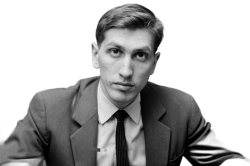
The Mystery of Bobby Fischer in Sousse
14.02.2024 05:58 | HistoryIn 1967, the Interzonal Tournament was held in Sousse, Tunisia. This event was a qualifier for the Candidates Matches, a format adopted at Fischer's suggestion, replacing the Candidates Tournament.
Many of you may know that this was the tournament Bobby Fischer famously did not complete. This article aims to delve into what happened and why Fischer left the tournament, drawing primarily from English Wikipedia and the book "My Great Predecessors, Part 4."
Fischer's arrival in Sousse was noteworthy. Unlike his late arrival at the Buenos Aires tournament in 1970, Fischer arrived early in Sousse, greeting everyone with a beaming smile, which was not typical behavior for him.
The tournament featured a formidable lineup, including eminent Soviet grandmasters Korchnoi, Stein, and Geller, alongside strong international grandmasters like Larsen, Hort, Gligorić, Portisch, and Reshevsky, among others.
It's important to note that Fischer was a Seventh-day Adventist at the time, which prohibited him from playing on Fridays and before sunset on Saturdays. The organizers accommodated this, as they did for Reshevsky, who had similar requirements. As a result, their Saturday games started at 7 pm, a time when games were typically adjourned and moves sealed for continuation on another day. Despite scheduled rest days, these often coincided with the completion of adjourned games, leaving little time for rest or analysis. Fischer also had religious holidays in October that required further scheduling adjustments, as the tournament ran from October to November.
Fischer's performance was initially stellar. By the seventh round, he had impressively defeated three-time USSR Champion Stein. It was noteworthy that Fischer had expressed a desire to play a match against Stein in 1966.
However, Fischer's demands for "the best playing conditions" began to cause friction. He moved from table to table, citing issues with noise, lighting, etc., which likely frustrated the organizers, as no other player seemed to have such issues.
Fischer did not play in the 8th and 9th rounds due to religious reasons and had two unfinished games. He was shocked to find out that the schedule would require him to play four consecutive games followed by a single day off and then another five consecutive games. Fischer requested an additional rest day, threatening to withdraw from the tournament if his demands were not met.
The situation escalated quickly, involving the press attaché of the American embassy, who tried to persuade Fischer to continue playing, representing the USA. Fischer retorted that he was representing no one but himself, packed up, and left, resulting in his default in the 10th round against Soviet grandmaster Gipslis.
Yet, Fischer's saga did not end there. The next day, he was scheduled to play against Reshevsky. Surprisingly, Fischer appeared 53 minutes after the clocks started, played 1.e4, and won the game as Reshevsky offered little resistance.
Reshevsky was so upset by the defeat that he wrote a protest letter, which Fischer tore up without reading.
When the president of the Tunisian Chess Federation promised Fischer a rest day, it seemed the issues were resolved, and Fischer continued to play, notably defeating Robert Byrne.
However, before the 13th round, Fischer questioned the status of his game against Gipslis. He argued that if he were to withdraw from the tournament at that point, his previous results would not count. He stated that he could not continue in the tournament with a loss to Gipslis, effectively issuing an ultimatum to the organizers.
Fischer did not show up for his next game, defaulted another game, and was set to lose by default against Larsen. Despite attempts by the organizers to persuade Fischer to play, he requested to reschedule the game, which Larsen refused, leading to Fischer's third default and his withdrawal from the tournament.
At the time of his withdrawal, Fischer had scored 8.5 points out of 10 games. It was perhaps the first time a leading player had withdrawn from a tournament, as noted by Paul Keres.
%20(1).png)
Speculation abounded that Fischer withdrew due to fear of facing Spassky or being unprepared for the World Championship match in 1969 (then held by Petrosyan). It's hard to predict how a Fischer vs. Spassky match around 1968 might have concluded. However, it's clear that throughout his chess career, Fischer was uncompromising. Any failure to meet his demands often led to his withdrawal from chess, as seen in 1972 for twenty years. The year 1967 also marked a turning point; in 1968, Fischer played only in minor tournaments, and in 1969, he played only one serious game. His significant comeback occurred in 1970.
